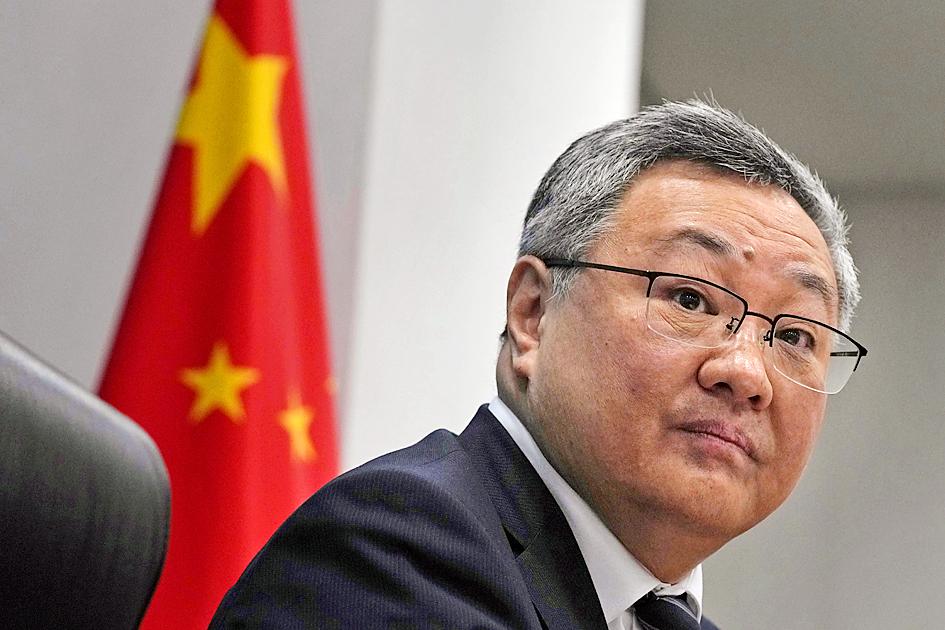China yesterday said that it would continue to “modernize” its nuclear arsenal, while calling on the US and Russia to reduce their own stockpiles a day after global powers pledged to prevent such weapons from spreading.
In a rare joint statement setting aside rising tensions, the US, China, Russia, the UK and France reaffirmed their goal of creating a world free of nuclear weapons and avoiding a nuclear conflict.
The five nuclear powers also committed to full future disarmament from nuclear weapons, which have only been used in conflict in the US bombings of Japan at the end of World War II, but squaring that rhetoric with reality would not be easy at a time of spiraling tensions between those same global powers not seen since the Cold War.

Photo: AP
There are growing global concerns about China’s rapid military modernization, especially after its armed forces last year announced they had developed a hypersonic missile that can fly at five times the spread of sound.
The US has also said that China is expanding its nuclear arsenal to as many as 700 warheads by 2027 and possibly 1,000 by 2030.
China yesterday defended its nuclear weapons policy, and said Russia and the US — by far the world’s largest nuclear powers — should make the first move on disarmament.
“The US and Russia still possess 90 percent of the nuclear warheads on Earth,” Chinese Ministry of Foreign Affairs Department of Arms Control Director-General Fu Cong (傅聰) told reporters. “They must reduce their nuclear arsenal in an irreversible and legally binding manner.”
Fu dismissed US claims that China was vastly increasing its nuclear capabilities.
“China has always adopted the ‘no first use’ policy and we maintain our nuclear capabilities at the minimal level required for our national security,” he said.
However, he said Beijing would “continue to modernize its nuclear arsenal for reliability and safety issues.”
Ties between Beijing and Washington have been strained over a series of issues, including Beijing’s saber-rattling toward Taiwan, which has reached new heights under Chinese President Xi Jinping (習近平), the nation’s most authoritarian leader in a generation.
Fu dismissed speculation over the possibility of deploying nuclear weapons near the Taiwan Strait.
“Nuclear weapons are the ultimate deterrent, they are not for war or fighting,” he said.
While the US and Russia have had a formal strategic stability dialogue since the days of the Cold War, producing several disarmament agreements, that is not the case between Washington and Beijing.
In Europe, tensions with Moscow have deteriorated over a Russian troop buildup close to its border with Ukraine. That has raised fears that the Kremlin, worried by the possibility of further eastward expansion of NATO, is planning a new attack on its neighbor.
Crunch talks between Russia and the US on European security are expected in Geneva, Switzerland, on Monday next week.

OPTIMISTIC: The DGBAS sharply upgraded its GDP growth estimate from 3.54 percent to 7.71 percent after the Taiwan-US trade agreement signing and given AI optimism The US imported more from Taiwan than China for the first time in decades, as US President Donald Trump’s tariffs reshape trade flows while a global boom in artificial intelligence (AI) fuels demand for tech products. US purchases of goods from China plunged almost 44 percent in December last year from 2024 to US$21.1 billion, US Department of Commerce data showed on Thursday. By contrast, shipments from Taiwan more than doubled during the same period to US$24.7 billion. The soaring Taiwanese shipments to the US reflect the huge expansion in supplies of chips and servers for AI companies, which has completely changed

The Central Election Commission has amended election and recall regulations to require elected office candidates to provide proof that they have no Chinese citizenship, a Cabinet report said. The commission on Oct. 29 last year revised the Measures for the Permission of Family-based Residence, Long-term Residence and Settlement of People from the Mainland Area in the Taiwan Area (大陸地區人民在台灣地區依親居留長期居留或定居許可辦法), the Executive Yuan said in a report it submitted to the legislature for review. The revision requires Chinese citizens applying for permanent residency to submit notarial documents showing that they have lost their Chinese household record and have renounced — or have never

US and Chinese fighter jets briefly faced off above waters near the Korean Peninsula this week, Yonhap News agency reported, marking a rare confrontation in that area between the two superpowers. About 10 US fighter jets on Wednesday departed an airbase in Pyeongtaek, South Korea, for drills above international waters off South Korea’s western coast, the news outlet cited unidentified military sources as saying. While the US planes did not enter China’s air defense identification zone, Beijing scrambled planes as they neared that region, the report said. “The Chinese People’s Liberation Army organized naval and air forces to monitor and effectively respond

Taiwan has secured another breakthrough in fruit exports, with jujubes, dragon fruit and lychees approved for shipment to the EU, the Ministry of Agriculture said yesterday. The Animal and Plant Health Inspection Agency on Thursday received formal notification of the approval from the EU, the ministry said, adding that the decision was expected to expand Taiwanese fruit producers’ access to high-end European markets. Taiwan exported 126 tonnes of lychees last year, valued at US$1.48 million, with Japan accounting for 102 tonnes. Other export destinations included New Zealand, Hong Kong, the US and Australia, ministry data showed. Jujube exports totaled 103 tonnes, valued at